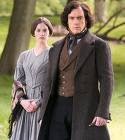In her novel Wide Sargasso Sea, Jean Rhys develops the theme of identity using laughter to convey the sense of comfort and belonging possessed by each character. The direction and timing of laughter in this novel clearly reveals the changing positions of characters that occurs in the novel, as well as the personalities of some of the less well described characters.
Part one of the novel focuses primarily on Antoinette’s childhood and her early relationship with her island and her mother. In this section, the laughter most clearly originates from the native island people and is directed at Antoinette and her family. White but poor, the Creole family is neither properly white nor negro. They were “something to laugh at (19),” as Antoinette’s mother admitted, often called “white cockroaches” (13), or “white nigger”(14), and when the natives walked by their house and saw Antoinette’s mother, “they stared, sometimes they laughed” (11). The early introduction of condescending laughter foretells the way that laughter is used throughout the novel to set apart those that belong as they mock those that do not.
In a slightly different but related way, laughter is also used in this section to denote power. When Antoinette’s mother marries wealthy Mr. Mason, Antoinette knows that “Mr. Mason would laugh if he knew how frightened I had been [of Christophine’s imaginary obeah artifacts]. He would laugh even louder that he did when my mother told him that she wished to leave Coulibri” (19). Although Mr. Mason is clearly not a native of the island, being in a position of power is something he feels comfortable with, and this allows him to expel condescending laughter.
This type of laughter is mirrored later in the novel by Antoinette’s husband after his will finally eclipses her own. In the beginning of part two, Rochester never laughs, presumably because of his feeling of discomfort at being in such a “strange,” “alien,” place that belongs so much more to Antoinette than to him. Antoinette, however, laughs often when first arriving on the island, with Christophine and at Rochester when he asks, “Why do you hug and kiss Christophene?...I couldn’t (54)” At one point, Rochester even admits, “I tried to laugh (82),” but his failure to do so indicates that he does not yet feel comfortable or powerful. However, as Antoinette’s unhappiness with her marriage begins to consume her, she tries and fails to enchant Rochester with a love potion-poison. The effects of her attempt disable her with despair but empower Rochester. Seemingly with newfound confidence, Rochester sleeps with the servant Amelie within earshot of Antoinette and begins laughing for the first time since they arrived on the island.
Rochester’s laughter suggests that he has finally become comfortable, both in his geographic location and in his position relative to Antoinette. Soon after his affair with Amelie, he learns that Chritophine is leaving, and this too causes him to laugh because he knows that his presence has run her off the island, just as he wished. When Rochester goes to talk to Christphine, the native woman reprimands him for his treatment of Antoinette, and Rochester laughs at her: “Of course I laugh at you – you ridiculous old woman. I don’t mean to discuss my affairs with you any longer. Or your mistress.”
Rochester’s ability to laugh at Christophine, a native of the island and Antoinette’s caretaker, reveals a stark change in his character and his level of comfort in his position. His laughter signifies the beginning of his total control over Antoinette, and it is at this point that he can bring his now crazy, powerless wife back to England and keep her locked in the attic until she kills herself and brings the house down with her.
Tuesday, June 2, 2009
Subscribe to:
Post Comments (Atom)










No comments:
Post a Comment